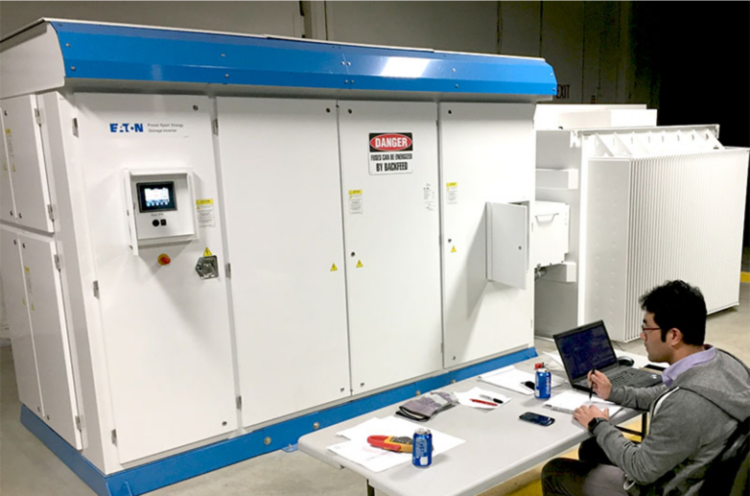
A flexible learning platform for Battery workforce training in New York
Whether your goal is to broaden your job prospects, advance your career, or even make a bold return to the workforce in New York State, the NENY Battery Academy’s micro-credentialing program can be your stepping stone to reach your goals. Start your learning journey with us today!
A Credential that Counts

Gain short, focused credentials designed to provide the skills, know-how, and experience that employers are looking for. Our stackable micro-credentials offer a pathway to career placement, whether you’re just starting or are looking to up-skill in the energy industry. These stackable micro-credentials are achieved through individual courses and programs you complete with NENY Battery Academy. Give your resume a boost and try a class that fits your career goals!
New course: Introduction to Energy Storage
Are you curious about the future of clean energy? Start with our latest short course, Introduction to Energy Storage, featuring expert lectures from Binghamton University faculty. This accessible, foundational online course is designed to prepare learners for careers in the growing field of energy storage—a critical component of the renewable energy transition.

Discover how energy storage works, its role in supporting a renewable energy system, and the groundbreaking technologies shaping this vital industry. This is your chance to gain essential knowledge that positions you for success in one of the fastest-growing sectors in clean energy.
What You’ll Learn:
- The Science of Energy Storage: Explore the principles behind capturing and storing energy.
- Comparative Storage Methods: Understand the differences between batteries, thermal systems, and mechanical storage.
- Energy Storage and the Grid: See how energy storage integrates with the electric grid to create a more sustainable energy future.
- Emerging Technologies: Get insights into cutting-edge battery technologies and grid innovations driving the next generation of clean energy.
Course Features:
- 3 Self-Paced Modules: Each module builds on your understanding of energy storage, offering a step-by-step learning journey.
- Engaging Video Lessons: Expert-led video lessons are paired with knowledge checks and real-world case studies to solidify your learning.
- Downloadable Resources: Access a full course transcript and a downloadable guide for on-the-go learning.
- Completion Badge: Pass a graded assessment and earn a completion badge to showcase your new skills.
Battery Technician Program

New York State’s demand for mobile electrical solutions, grid integration of batteries, and domestic battery manufacturing continues to rise, the need for skilled professionals in the battery industry is growing exponentially. Our Battery Technician Program offers courses designed to provide a solid foundation in battery technologies, storage systems, and their diverse applications, enhancing your expertise and employability in this growing field.
Program Details
- Duration: 25 hours
- Format: Online and self-paced, accessible immediately
- Support: Virtual office hours with battery experts
- Challenge Level: Intermediate
Courses in the Battery Technician Program
These courses are also offered individually through our course catalog.
Course 1: Battery Types and Functions
In this course, you will be introduced to the basic definitions and classifications of batteries. You will examine a sampling of the current most popular batteries we use daily, see the basic chemical composition of a battery, and understand the advantages and disadvantages of each type of battery.
Course 2: Basic Technical Battery Characteristics
This course introduces you to the basic vocabulary and technical characteristics of a battery. Course topics include:
- Vocabulary of Energy Storage in Batteries
- Battery Capacity and Energy
- The Importance of Battery Testing
- Battery Definitions, Datasheets, and Characteristics
Course 3: Battery Modules, Packs and Systems
This course shows how to distinguish the components of a Battery system. Topics include:
- Series-Parallel Connection
- Components of a Battery System
- Introduction to Battery Management Systems
- Battery Management Systems Topologies
Course 4: Safety and Regulation
This course focuses on the norms and standards for stationary and mobile battery applications. Topics included in this course:
- Battery Storage and Climate Change: Policies, Standards, Incentives
- Battery Standards and Regulations
- Functional Safety and Security
Course 5: Energy Storage Stationary Applications
This course presents the main customer benefits of home energy storage systems and describes examples of grid integration services of energy storage systems.
- Flexibility Needs and the Role of Battery Storage
- A Closer Look into Battery Storage Technologies
- Grid-Scale Application Battery Storage
- Behind-the-Meter Battery Storage Application
- Benefits of Storage Facilities at Home
- Benefits and Challenges of Local Grids
- Local Energy Storage to Manage Increasing Need of EV Charging
- Home Storage Part 1
- Application Example: Home Battery Storage Systems
- Home Storage Part 2
Course 6: Mobile and Consumer Electronics Applications
This course digs into the main mobile applications and small electrical devices. Topics covered in this course include:
- Battery for Electric Vehicles – Price Development and Trends of Use
- Electrical Drives in Transportation: Overview of Technologies
- Charging Infrastructure
- Battery Storage Application in Mobility
- Battery Powered Consumer Electronics
- Application Example: Energy Efficiency of a USB Power Bank
Course 7: End of Life, Second Life and Recycling
In this course, you will learn how to dismantle a battery pack, how and why we reuse batteries, and gain an in-depth look at the physical and chemical processes involved in battery recycling. Topics covered in this course include:
- Dismantling a Battery Pack
- Reuse of Batteries
- EV batteries for Stationary Energy Storage
- Battery Recycling-General Overview
- Battery Recycling-Physical Processing
- Battery Recycling-Hydrometallurgical Processing
Battery Storage and the Energy Transition program

This learning pathway consists of three courses designed to provide a deep understanding of the role and application of battery storage in the evolving energy landscape. Each course focuses on different aspects of energy storage, from historical energy systems to the practical challenges and applications of battery storage technologies. This program is ideal for anyone working or seeking jobs in New York State with previous experience in the battery and energy storage system industry.
Program Details
- Duration: 7 hours
- Format: Online and self-paced, accessible immediately
- Support: Virtual office hours with battery expert
Courses in the Battery Storage and the Energy Transition Program
These courses are also offered individually through our course catalog.
The Energy System - Present and Future
This course provides an overview of the historical and future perspectives of the energy system. It discusses the shift from fossil fuels to renewable technologies and the economic, political, and technological factors driving this transition.
The Importance of Energy Storage
This course explores the critical need for energy storage in the current and future energy markets. It covers different storage technologies, the flexibility needs in the electricity market, and key considerations for developing energy storage projects.
Applications and Challenges of Battery Storage
This course delves into the specific applications and challenges of battery storage technologies. It examines various battery technologies, their grid-scale and behind-the-meter applications, and the emerging trends in off-grid and mobility.
Battery Management, Connection and control program

This program consists of six courses and starts with a deep dive into power conversion systems that connect storage systems to smart grids and consumers. It explores Battery Management Systems (BMS), the masterminds behind battery packs, and the critical parameters that BMS can control. Learners will discover how to use battery testing and operation simulation to predict real-world in-service behavior. This program is ideal for anyone working or seeking jobs in New York State with previous experience in the battery and energy storage system industry.
Program Details
- Duration: 25-30 hours
- Format: Online and self-paced, accessible immediately
- Support: Virtual office hours with battery experts
- Challenge Level: Advanced
Battery Management, Connection and Control Program
These courses are also offered individually through our course catalog.
Power Electronic Converters
In this course, you’ll explore the critical role of power converters in modern electrical systems. You’ll delve into the essential principles of power conversion and examine various types of power converters. Through contemporary electrical examples, you’ll learn to recognize different voltages, currents, and power levels, and understand the distinctions between AC and DC power. By the end of this course, you’ll possess a clear understanding of power converters’ significance in a range of electrical applications.
Power Conversion and Efficiency in Battery Systems
In this course, you will be taken into the lab to get acquainted with power conversion principles and efficiency measurements. You will learn how to match the right type of converter to various real-world battery applications, while assessing overall system performance with respect to energy efficiency. The lessons will give you the knowledge you need to be able to list the main origins of losses in battery packs and judge the impact of the charge and discharge rates on battery efficiency and effective capacity. You will also see some examples of the use of power electronic interfaces for batteries and compare power electronic interfaces across applications.
Power Electronics and Grid Connection
In this course, you will explore in-depth power conversion systems (PCSs) from a power electronics standpoint. You will delve into the essential topologies and functionalities of these systems, which serve as intermediaries between batteries and the electrical systems they are connected to. These electrical systems can range from the power grid and automotive powertrains to building distribution systems. By the end of this module, you will have gained a comprehensive understanding of PCSs and their vital role in connecting batteries to various electrical systems.
Battery Management Systems
In this course, you will gain an introduction to various battery testing methods that facilitate comprehensive evaluation of battery cells and systems following manufacturing. You will examine the significance of testing and delve into the relevant standards, necessary testing infrastructure, and analysis tools. You will explore the creation and integration of battery models across different applications to assess battery performance during usage. By the end of this module, you will have a solid understanding of battery testing methodologies, the importance of standardized testing, and the role of battery models in evaluating performance.
Modeling, Control and Simulation of Batteries
In this course, you will explore the battery operation modeling, control, and simulation in greater detail. You will gain a comprehensive understanding of the voltage discharge curves that serve as typical characteristics of battery cells. You will delve into the concept of equivalent electrical circuits, which enable us to accurately model battery cells. You will learn how to identify the necessary parameters of these equivalent circuits from datasheets and acquire the ability to effectively tune the controllers of DC-DC converters for battery applications. By the end of this module, you will have a solid grasp of battery modeling, control techniques, and simulation, empowering you to optimize battery performance in practical scenarios.
Course 1: Power Electronic Converters
- Business Modelling in the Energy Sector
- The Business Model Canvas Framework
- Drivers for Business Model Innovation
- Business Models: A Network-Level Perspective
- Business Models: A Service-Level Perspective
- Challenges Changing Business Model
- The Business Model as a Strategic Tool
Course 2: Power Conversion and Efficiency in Battery Systems
- Behind-the-Meter Application
- Benefits of Storage Facilities at Home
- Behind-the-Meter Storage in Apartments and Villas
- Behind-the-Meter Storage Impacts in Network Operators
- Benefits and Challenges of Local Grids
- Local Energy Storage to Manage the Increasing Need for EV Charging
Course 3: Power Electronics and Grid Connection
In this short course, you will explore the main battery storage technology groups. We will dig a bit deeper into four different battery storage applications: grid-scale, behind-the-meter, off-grid battery storage and electromobility. For these applications, you will also relate existing barriers and drivers in the market to business solutions. Topics covered in this course include:
- A Closer Look Into Battery Storage Technologies
- Grid-scale Application Battery Storage
- Behind-the-meter Battery Storage Application
- Battery Storage Application at Off-grid
- Battery Storage Application in Mobility
Course 4: Battery Management Systems
- Introduction to Battery Management Systems
- Battery Management Systems Topologies
- Battery Management Systems Components and Requirements
- Functional Safety and Security
- State of Charge Estimation
- State of Health Estimation
- Battery Cell Balancing
Course 5: Battery Testing
- The Importance of Battery Testing
- Battery Definitions, Datasheets, and Characteristics
- Battery Standards and Regulations
- Electrical, Thermal and Mechanical Tests
- Battery Laboratory and Battery Testing Equipment
- Battery Testing Procedures and Examples
- Battery Analysis – From Raw Data to Specific Battery Parameters
- Battery Modelling at Cell and Pack Level
Course 6: Modeling, Control and Simulation of Batteries
This course digs into the main mobile applications and small electrical devices. Topics covered in this course include:
- Battery for Electric Vehicles – Price Development and Trends of Use
- Electrical Drives in Transportation: Overview of Technologies
- Charging Infrastructure
- Battery Storage Application in Mobility
- Battery Powered Consumer Electronics
- Application Example: Energy Efficiency of a USB Power Bank
UPCOMING COURSE RELEASES
Coming in Summer to Fall 2024
Battery Fundamentals Program
- Introduction to Batteries
- Electrochemical Concepts Behind Batteries
- Current Battery Technologies
- Emerging Battery Technologies
Battery Storage Value Chain Program
- Battery Storage Raw Materials and Supply Chain
- From Materials to Battery Cells
- Batteries End of life, Re-use and Re-cycling
Battery Storage Applications Program
- Battery Storage at Grid Scale
- Battery Storage Behind the Meter
- Battery Storage for Mobility
- Battery Storage for Industrial Applications (underground mining)
Battery Storage Business Models, Market, and Regulation Program
- Business Modeling
- Investment Scenarios and Business Models for Battery Storage Systems
- Legislation and policy
- Cost assessment of battery-based storage solutions
- Business examples
For industry
Explore Career Pathways in the Battery Value Chain
No matter your experience in the energy storage or battery technology industry there is a path for you at the NENY Battery Academy. Learn more below about each stage of the battery value chain including careers in those areas and what programs you can take to break into this industry.
- Chemistries and Components
- Cells and Modules
- Packs and Systems
- Applications and Original Equipment Manufacturer
- Materials and Recycling
Explain what careers in this part of the battery lifecycle entail. Explore job titles. Link to what courses or program would be beneficial for this person to take to get into this part of the battery value chain.
Explain what careers in this part of the battery lifecycle entail. Explore job titles. Link to what courses or program would be beneficial for this person to take to get into this part of the battery value chain.
Explain what careers in this part of the battery lifecycle entail. Explore job titles. Link to what courses or program would be beneficial for this person to take to get into this part of the battery value chain.
Explain what careers in this part of the battery lifecycle entail. Explore job titles. Link to what courses or program would be beneficial for this person to take to get into this part of the battery value chain.
Explain what careers in this part of the battery lifecycle entail. Explore job titles. Link to what courses or program would be beneficial for this person to take to get into this part of the battery value chain.
Partners at the NENY Battery Academy












